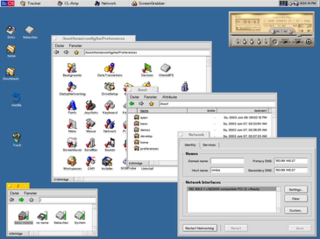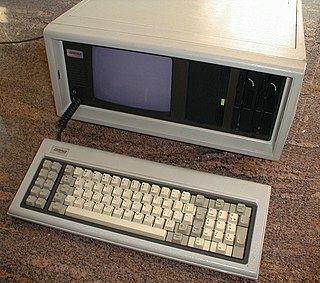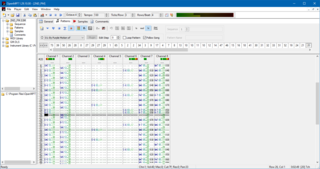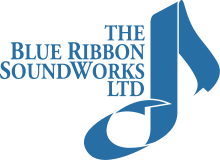
Amiga is a family of personal computers introduced by Commodore in 1985. The original model is one of a number of mid-1980s computers with 16- or 16/32-bit processors, 256 KB or more of RAM, mouse-based GUIs, and significantly improved graphics and audio compared to previous 8-bit systems. These systems include the Atari ST—released earlier the same year—as well as the Macintosh and Acorn Archimedes. Based on the Motorola 68000 microprocessor, the Amiga differs from its contemporaries through the inclusion of custom hardware to accelerate graphics and sound, including sprites and a blitter, and a pre-emptive multitasking operating system called AmigaOS.

BeOS is an operating system for personal computers first developed by Be Inc. in 1990. It was first written to run on BeBox hardware.

Commodore International was an American home computer and electronics manufacturer founded by Jack Tramiel. Commodore International (CI), along with its subsidiary Commodore Business Machines (CBM), was a significant participant in the development of the home-computer industry in the 1970s, 1980s and early 1990s. The company developed and marketed the world's best-selling computer, the Commodore 64 (1982), and released its Amiga computer line in July 1985. With quarterly sales ending 1983 of $49 million, Commodore was one of the world's largest personal computer manufacturers.

A sound card is an internal expansion card that provides input and output of audio signals to and from a computer under the control of computer programs. The term sound card is also applied to external audio interfaces used for professional audio applications.

Steven Anthony Ballmer is an American billionaire businessman and investor who served as the chief executive officer of Microsoft from 2000 to 2014. He is the owner of the Los Angeles Clippers of the National Basketball Association (NBA). As of June 2023, Bloomberg Billionaires Index estimates his personal wealth at around $119 billion, making him the sixth-richest person in the world.

IBM PC compatible computers are similar to the original IBM PC, XT, and AT, all from computer giant IBM, that are able to use the same software and expansion cards. Such computers were referred to as PC clones, IBM clones or IBM PC clones. The term "IBM PC compatible" is now a historical description only, since IBM no longer sells personal computers after it sold its personal computer division in 2005 to Chinese technology company Lenovo. The designation "PC", as used in much of personal computer history, has not meant "personal computer" generally, but rather an x86 computer capable of running the same software that a contemporary IBM PC could. The term was initially in contrast to the variety of home computer systems available in the early 1980s, such as the Apple II, TRS-80, and Commodore 64. Later, the term was primarily used in contrast to Apple's Macintosh computers.

Wintel is the partnership of Microsoft Windows and Intel producing personal computers using Intel x86-compatible processors running Microsoft Windows.
NewTek, Inc. is a San Antonio, Texas–based hardware and software company that produces live and post-production video tools and visual imaging software for personal computers. The company was founded in 1985 in Topeka, Kansas, United States, by Tim Jenison and Paul Montgomery. On April 1, 2019, it was announced that NewTek would be acquired by Vizrt.

A music tracker is a type of music sequencer software for creating music. The music is represented as discrete musical notes positioned in several channels at chronological positions on a vertical timeline. A music tracker's user interface is traditionally number based. Notes, parameter changes, effects and other commands are entered with the keyboard into a grid of fixed time slots as codes consisting of letters, numbers and hexadecimal digits. Separate patterns have independent timelines; a complete song consists of a master list of repeated patterns.

A digital audio workstation (DAW) is an electronic device or application software used for recording, editing and producing audio files. DAWs come in a wide variety of configurations from a single software program on a laptop, to an integrated stand-alone unit, all the way to a highly complex configuration of numerous components controlled by a central computer. Regardless of configuration, modern DAWs have a central interface that allows the user to alter and mix multiple recordings and tracks into a final produced piece.
OctaMED is a music tracker for the Amiga, written by Teijo Kinnunen. The first version, 1.12, was released in 1989 under the name MED, which stands for Music EDitor. In April 1990, version 2.00 was released with MIDI support as the main improvement. In 1991 the first version with the name OctaMED was released, so-called as it could replay eight independent channels on the Amiga's four-channel sound chip. This was also the first commercial version of the software. The publisher throughout has been RBF Software of Southampton, UK which is run by Ray Burt-Frost.
A personal computer game, also known as computer game or abbreviated PC game, is a electronic game played on a personal computer (PC) and form of video game. They are defined by the open platform nature of PC systems.

The TMS34010, developed by Texas Instruments and released in 1986, was the first programmable graphics processor integrated circuit. While specialized graphics hardware existed earlier, such as blitters, the TMS34010 chip is a microprocessor which includes graphics-oriented instructions, making it a combination of a CPU and what would later be called a GPU. It found use in arcade video games from the late 1980s through the mid 1990s, including Mortal Kombat and NBA Jam, and computer workstation video accelerator boards. TI later released the TMS34020 with an emphasis on 3D rendering.

Aurora is Susumu Hirasawa's fourth solo album.

Microsoft PixelSense was an interactive surface computing platform that allowed one or more people to use and touch real-world objects, and share digital content at the same time. The PixelSense platform consists of software and hardware products that combine vision based multitouch PC hardware, 360-degree multiuser application design, and Windows software to create a natural user interface (NUI).

Creative Technology Ltd. is a Singaporean multinational technology company. The principal activities of the company and its subsidiaries consist of the design, manufacture and distribution of digitized sound and video boards, computers and related multimedia and personal digital entertainment products. It also partners with mainboard manufacturers and laptop brands to embed its Sound Blaster technology on their products.

Home computers were a class of microcomputers that entered the market in 1977 and became common during the 1980s. They were marketed to consumers as affordable and accessible computers that, for the first time, were intended for the use of a single nontechnical user. These computers were a distinct market segment that typically cost much less than business, scientific or engineering-oriented computers of the time such as those running CP/M or the IBM PC, and were generally less powerful in terms of memory and expandability. However, a home computer often had better graphics and sound than contemporary business computers. Their most common uses were playing video games, but they were also regularly used for word processing and programming.
Eyetech Group Ltd is a company founded in 1983, in order to provide commercial companies with automatical data collection systems. They had already been involved in the provision of the automatic toll collection systems used at the Dartford River Crossing, as well as many of the bar code based tracking systems used by UK national parcel service.

Limor Fried is an American electrical engineer and owner of the electronics hobbyist company Adafruit Industries. She is influential in the open-source hardware community, having participated in the first Open Source Hardware Summit and the drafting of the Open Source Hardware definition, and is known by her moniker ladyada, an homage to Lady Ada Lovelace.
This article deals with music software created for the Amiga line of computers and covers the AmigaOS operating system and its derivates AROS and MorphOS and is a split of main article Amiga software. See also related articles Amiga productivity software, Amiga programming languages, Amiga Internet and communications software and Amiga support and maintenance software for other information regarding software that run on Amiga.













